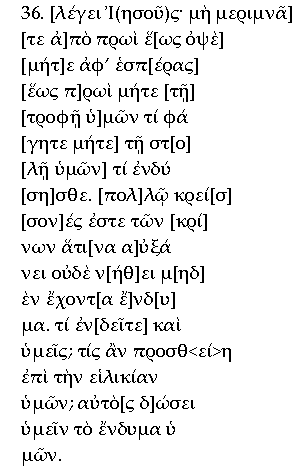Visitor Comments
Worrying about outward appearance is a condition of vanity and pride. Worry separates us from Truth and Light.
- whacky
Your faith in God should be such that you have no concern for lacking something necessary to your life. You should expect that if you truly need something you need only hold out your hand and what you truly need will be placed in it. If nothing is placed there, then you did not truly need anything which you did not already have. A lesser faith than this means that you do not truly understand the nature of yourself and of God.
- active-mystic
Do not do what you think you're supposed to do. The innate self provides meaning for everything one does.
- Rodney
Confidential advice given by a teacher to his students. Trust me. I know what is right for you. I [and only I] can prescribe. You cannot reliably prescribe for yourself so stop agonising about it. This advice not intended for public consumption.
- Thief37
It's like when a doctor gives you a prescription: he knows your sickness and knows what you need to get better. God knows what you need to have faith, and he will give you his guidance if you need it, but he won't give you anything that you do not need.
- Meg
|
Scholarly Quotes
Joseph A. Fitzmyer writes: "The thirty-sixth Coptic saying, which corresponds to this Oxyrhynchus fragmentary text, is much shorter than the Greek. It may represent a different Greek recension of the Gospel or a deliberate shortening of the text in the Coptic. At any rate, we can only use the Coptic as a control for the restoration of the first few lines of the Greek text." (Essays on the Semitic Background of the New Testament, p. 406)
Robert M. Grant and David Noel Freedman write: "Do not worry about what you will wear (Matthew 6:25; Luke 12:22). 'Morning and evening' are presumably Thomas's substitutes for 'the morrow' of Matthew 6:34. In the Greek version more quotations from the gospels are provided (Matthew 6:25, 28, 27; Luke 12:22, 27, 25). This fact may suggest that the editor of Coptic Thomas wanted to remove such obvious traces of his sources." (The Secret Sayings of Jesus, p. 152)
Joseph A. Fitzmyer writes: "There is no reason why this form of the saying should not be given the same degree of authenticity that is accorded the canonical versions. E. Jacquier (RB 15 [1918] 116) regarded it as authentic, but J. Jeremias (Unknown Sayings, 86) would consider only the last three lines as authentic. He rejects the rest because he makes of this and the following saying but one unit. Since the following saying is marked with Gnostic ideas on sexual asceticism, it is not to be regarded as authentic (ibid., 17). However, I do not believe that these two sayings should be treated as one. The change of subject in line 17 is the beginning of a new saying, as is now evident from several similar cases in the Coptic version. See note on Oxy P 654:32. This saying deals only with excessive solicitude for food and clothing and the correct dependence that the Christian should have on the Father." (Essays on the Semitic Background of the New Testament, p. 407)
Funk and Hoover write: "Verses 3-4 are gnostic additions. Thomas 37 is actually an expansion on these remarks, although 36:3-4 are preserved only in Greek Thomas. The notion that humans will return to the primordial state of sexual non-differentiation when they put off the body (their clothes) is congenial to the developing gnostic trend. These additions provide a peculiar setting for the sayings in vv. 1-2, but they seem not to have led to the revision of the primary sayings." (The Five Gospels, p. 493)
Gerd Ludemann writes: "The key to the history of the tradition is provided by that part of the Greek version which goes beyond the Coptic translation. It contains, first, a modification of the Coptic version (underlined); secondly, at the end (= vv. 3-4), a Gnostic interpretation (the symbol of the garment); and thirdly, before that, a part (= v. 2) which recalls Matt. 6.25-31/Luke 12.22-29). As the Gnostic part is certainly secondary, the same conclusion may be drawn about the other pieces. The Coptic translation is probably an abbreviation of a Greek version." (Jesus After 2000 Years, p. 608)
|

